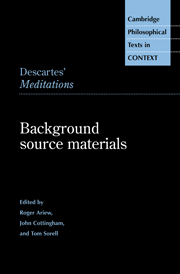Book contents
- Frontmatter
- Contents
- Preface
- Abbreviations
- General Introduction
- 1 Dialectic
- 2 That Nothing Is Known
- 3 The Promotion of Mathematics
- 4 Metaphysical Disputations
- 5 Wisdom
- 6 A Compendium of Philosophy in Four Parts
- 7 Corpus of Philosophy
- 8 The Use of Reason, The Impiety of the Deists, and The Truth of the Sciences
- 9 Unorthodox Essays against the Aristotelians
- 10 The Two Truths and The Immortality of the Soul
- 11 Dialogue on the Diversity of Religions and Little Skeptical Treatise
- 12 Universal Science
- 13 That God Exists
- Appendix: Condemnations of Cartesianism
- Bibliography
- Index
12 - Universal Science
Published online by Cambridge University Press: 05 June 2012
- Frontmatter
- Contents
- Preface
- Abbreviations
- General Introduction
- 1 Dialectic
- 2 That Nothing Is Known
- 3 The Promotion of Mathematics
- 4 Metaphysical Disputations
- 5 Wisdom
- 6 A Compendium of Philosophy in Four Parts
- 7 Corpus of Philosophy
- 8 The Use of Reason, The Impiety of the Deists, and The Truth of the Sciences
- 9 Unorthodox Essays against the Aristotelians
- 10 The Two Truths and The Immortality of the Soul
- 11 Dialogue on the Diversity of Religions and Little Skeptical Treatise
- 12 Universal Science
- 13 That God Exists
- Appendix: Condemnations of Cartesianism
- Bibliography
- Index
Summary
Introduction
Charles Sorel (1602–1674) was a man of letters best known for satirical histories and novels. He appears to have written some criticism of Descartes' friend Balzac, to which Descartes replied. He also outlined a “universal science” which on the surface appears to anticipate the project for an inclusive science outlined in Descartes' Discourse. In fact, and as the excerpts here show, Sorel's universal science is not Descartes'. For one thing, although its cardinal distinction is between spiritual and corporeal things, corporeal things come first in Sorel's order of investigation. In Descartes it is the other way round. Next, although Sorel's science is supposed to supplant what is taught in the schools, and includes much that was not included in the traditional curriculum, it does not appear to include or to be specially attuned to a reformed mathematics or to other reformed sciences. And it makes room for findings from alchemy and divination, the Cabala, and so on, that Descartes, whatever his sympathies for believers in these things, excludes from his science. On the other hand, Sorel does make room in universal science for a new grammar and a new art of reasoning, both reminiscent of Cartesian innovations. He thinks a new science ought to help people to live better and longer (as Descartes also believed), and that it ought to culminate in self-control and the elimination of vice.
- Type
- Chapter
- Information
- Descartes' MeditationsBackground Source Materials, pp. 219 - 229Publisher: Cambridge University PressPrint publication year: 1998

